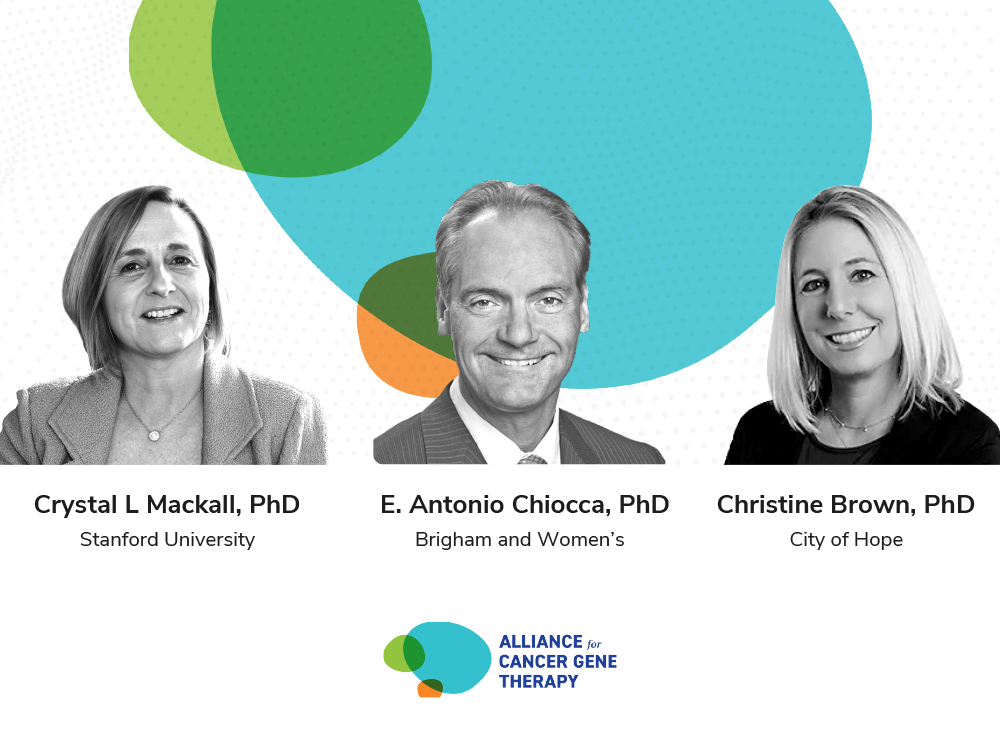Alliance for Cancer Gene Therapy’s world-class Scientific Advisory Council (SAC) held its annual meeting January 28 to discuss the past, present and future of cancer cell and gene therapy.
Most importantly, the attending members considered the next steps for the Alliance in terms of funding essential research initiatives.
After receiving guidance from accomplished scientists and doctors, Alliance for Cancer Gene Therapy feels confident in its next steps. The Alliance will further support and promote cancer cell and gene therapy research that tackles the complexity of solid tumors and advances therapies for more types of cancers and a greater number of patients.

“The payoff for Alliance for Cancer Gene Therapy is to be able to get things done, to fund and be the drivers of new initiatives and approaches that aren’t being funded through traditional means,” said Mitch Finer, PhD, CEO of LifeEdit, President of R&D, ElevateBio, and a member of ACGT’s SAC.

Michael Lotze, MD, Chief Cellular Officer, Nurix, and Chair of the SAC, added, “One of the strengths of Alliance for Cancer Gene Therapy has been its absolute insistence that we move the needle, and we get into the clinic and start testing questions early.”
Dr. Lotze, along with ACGT’s Chief Program Officer Barbara Lavery, moderated the meeting with an agenda covering cancer biology challenges in solid tumors, advances in CAR T cells for brain cancers, combination opportunities for oncolytic viruses, interrogating the tumor microenvironment, and funding strategies to advance breakthrough cell and gene therapies.
Presentations from SAC Members and an ACGT Fellow
The meeting included important presentations from five esteemed SAC members:
- Crystal Mackall, MD, founding director of Stanford University’s Center for Cancer Cell Therapy and associate director of the Stanford Cancer Institute
- Christine Brown, MD, deputy director the T Cell Therapeutics Research Laboratory at City of Hope
- E. Antonio Chiocca, MD, PhD, neurosurgeon-in-chief and chair of the Department of Neurosurgery at Brigham and Women’s Hospital
- John Bell, PhD, senior scientist of Ottawa Hospital Research Institute’s Centre for Innovative Cancer Research
- Stephen Russell, MD, PhD, chair of the Department of Molecular Medicine Program at the Mayo Clinic

Dr. Mackall reported on the present state of CAR T-cell therapy for pediatric cancers, including a presentation on her Phase 1 clinical trial treating diffuse intrinsic pontine glioma with CAR T cells. The trial shows early promise in using this type of cell and gene therapy to save the lives of children and young adults with this deadly brain cancer.
Dr. Brown provided an update on her research of CAR T cells for glioblastoma and other central nervous system malignancies. She expressed optimism in safely delivering CAR T-cell therapy intracranially (locoregional) to bypass the brain-blood barrier.
Dr. Chiocca, Dr. Bell and Dr. Russell presented encouraging updates on the potential of oncolytic viruses to treat solid tumors, including the Alliance’s current fundraising focus for pancreatic cancer and glioblastoma.
The group also heard a research status update from Brian Brown, MD, associate director of the Precision Immunology Institute at Icahn School of Medicine at Mount Sinai Hospital. He is an Alliance for Cancer Gene Therapy Fellow, having received funding in 2020 to target macrophages and enhance immunotherapy for lung cancer. Dr. Brown and his colleagues are developing technology to interrogate the tumor microenvironment to more fully understand tumor response to immunotherapies and how to use gene therapy for cancer.
Autologous versus allogeneic: future of CAR T-cell therapy
The meeting concluded with a thought-provoking discussion about the pros and cons of both autologous CAR T-cell therapy and allogeneic CAR T-cell therapy, along with the advancement of other cell types. Carl June, MD, Director of the Center for Cellular Immunotherapies at the University of Pennsylvania, and Chen Schor, CEO of Adicet Bio, led the conversation. Chen Schor is a member of the Alliance’s Board of Directors, while Dr. June is a Scientific Advisory Council member.
For the purposes of the discussion, Dr. June took the side of autologous CAR T-cell therapy, which involves using one patient’s T cells to create the therapy. This is the traditional approach – the one Dr. June and his team used in the initial development of CAR T cells for blood cancers.
Dr. June created the first FDA-approved CAR T-cell therapy for blood cancer, leading to remarkable tumor response rates and survival times. His accomplishments were recently highlighted in the scientific publication Nature, along with the New York Times, announcing the 10-year survival mark for the first patients in Dr. June’s CAR T-cell clinical trial for chronic lymphocytic leukemia. One of those patients, Doug Olson, is alive more than 11 years after his CAR T-cell infusion in 2010.
Schor debated in favor of allogeneic CAR T-cell therapy. This method extracts T cells from one or multiple healthy donors and mass produces them for cancer patients. Allogeneic therapy aims to be faster to produce and less costly than autologous therapy, while autologous therapy is personalized to each individual patient and has proven to be remarkably effective for blood cancers.

“So, if we can make the very best products, and I think it’s going to include oncolytic viruses, with all kinds of synthetic engineering, I think it makes a lot of sense to have both autologous and allogeneic cells,” Dr. June said. “Even with shorter persistence, if allogeneic therapies are ‘off the shelf’ and you can give them recursively, that’s a win. I think that there are going to be indications for both of these approaches.”
Purpose of Scientific Advisory Council
ACGT’s Scientific Advisory Council is the most powerful collaboration of thought leaders in cancer cell and gene therapy. The Council brings direction to the Alliance’s mission of creating a cancer-free future – and distinguishes Alliance for Cancer Gene Therapy from other funding agencies.
Your support strengthens the Scientific Advisory Council’s power in the same way CAR T cells enhance the immune system. Donate to the Alliance today to further advance our research to find cures for cancer.
Page sources
- A Cancer Treatment Makes Leukemia Vanish, But Creates More Mysteries. New York Times. Retrieved from: https://www.nytimes.com/2022/02/02/health/leukemia-car-t-immunotherapy.html. Accessed: 02/04/2022.



